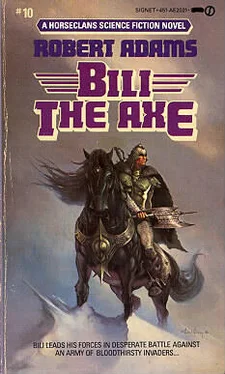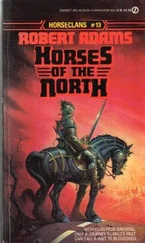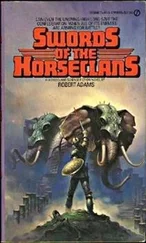Robert Adams - Bili the Axe
Здесь есть возможность читать онлайн «Robert Adams - Bili the Axe» весь текст электронной книги совершенно бесплатно (целиком полную версию без сокращений). В некоторых случаях можно слушать аудио, скачать через торрент в формате fb2 и присутствует краткое содержание. Жанр: Фантастика и фэнтези, на английском языке. Описание произведения, (предисловие) а так же отзывы посетителей доступны на портале библиотеки ЛибКат.
- Название:Bili the Axe
- Автор:
- Жанр:
- Год:неизвестен
- ISBN:нет данных
- Рейтинг книги:3 / 5. Голосов: 1
-
Избранное:Добавить в избранное
- Отзывы:
-
Ваша оценка:
- 60
- 1
- 2
- 3
- 4
- 5
Bili the Axe: краткое содержание, описание и аннотация
Предлагаем к чтению аннотацию, описание, краткое содержание или предисловие (зависит от того, что написал сам автор книги «Bili the Axe»). Если вы не нашли необходимую информацию о книге — напишите в комментариях, мы постараемся отыскать её.
But even as Bili and his warriors rally to the Kuhmbuhluhmers’ aid, the forces of the Witchmen are on the move again. Are Bili and Prince Bryuhn galloping straight into a steel-bladed trap from which death is the only release?
Bili the Axe — читать онлайн бесплатно полную книгу (весь текст) целиком
Ниже представлен текст книги, разбитый по страницам. Система сохранения места последней прочитанной страницы, позволяет с удобством читать онлайн бесплатно книгу «Bili the Axe», без необходимости каждый раз заново искать на чём Вы остановились. Поставьте закладку, и сможете в любой момент перейти на страницу, на которой закончили чтение.
Интервал:
Закладка:
Sir Geros and his lowlanders had come seeking some trace of a great lowlander dehrehbeh , who had been separated from the others during the period of earthquakes and forest fires and, in company with a similarly mixed lot of Ahrmehnee, Moon Maidens, mercenaries and Confederation nobility, had disappeared in the mountainous area south of what had once been the Tongue of Soormehlyuhn; with him had been the hereditary war leader of the Moon Maidens, the brahbehrnuh and at least two Ahrmehnee headmen.
Those Soormehlyuhns who had come south to help the tribe before their own lands were threatened had, of course, told the tale of the force of lowlanders that had miraculously appeared when all seemed irrevocably lost to save a mixed force of Ahrmehnee and Moon Maidens from a thousands-strong mob of Muhkohee raiders. They had then joined with those they had saved to drive the surviving Muhkohee off the Tongue of Soormehlyuhn, only to be themselves scattered if not killed when the massive shifting of the earth had shaken down the Tongue and altered the very shape of the land. Upon learning that these newcome lowlanders were mostly of that party and that those they had ridden so far to seek were also, they became much more acceptable to the previously hostile tribesmen.
The campaign which had followed had been hard-striking and brutal, with no quarter asked or given by either side, but no sooner had the victorious Behdrozyuhns and their new, stark allies seen the backs of one batch of Muhkohee invaders, it seemed, than did yet another come trotting or plodding over the western horizon.
Had all of the encroaching barbarians been in large parties or had significant numbers of them been armed fighters, not even Sir Geros and his force would have been of much help to the beleaguered Behdrozyuhns, save perhaps to cover the tribe’s evacuation of their homelands. But most of these Muhkohee seemed to be spiritless aggregations of less than a dozen to perhaps a score of men, women and children—some on foot, some in carts or wagons along with pigs and chickens or a few sheep or goats, with an occasional milk cow hitched behind. It was the rare one of these who bore anything even vaguely like a weapon, and those who did not immediately rum tail at the mere sight of a party of the steel-sheathed men on the big, lowland-bred horses were absurdly easy to direct back south and west, though some were heard to grumble that they wished the Plooshuhn-damned Kuhmbuhluhners would make up their minds. Such grumblings made no sense to the defenders, for there was not among Sir Geros’ force a single man from the Principality of Kuhmbuhluhn!
The savage bands of pony-mounted Muhkohee were, of course, another thing entirely, few wearing any sort of armor, but each and every one of them armed to the teeth with a wide variety of weapons—most homemade and primitive, but there wore a few rusty captured swords, spears, axes and dirks or knives.
Had it not been for the fact that the sole defensive items these tatterdemalions wore or bore were the occasional old and battered helmet, leathern caps sewn with bone or horn and crude shields of woven wicker and rawhide, Sir Geros and his force might have sustained far heavier losses than they had. But he and his well-armored and -armed veterans had been able to ride into the smaller mobs of Muhkohee and slay virtually at will the vicious but untrained, undisciplined, unarmored and ill-armed barbarians.
Nor was Sir Geros slow to take note of the reason for the bulk of such casualties as he did sustain; even if a fighter was not pinned or injured when his big horse went down, he had lost a part of his edge over his numerous opponents. Therefore, he had set every available hand to stitching padding between double thicknesses of strong cloth or leather, then sewing or riveting the resultant makeshift horse armor with disks of metal or hom, with scraps of Ahrmehnee chainmail or spare steel scales from the gear of his Freefighters—anything which might turn a blade or help to absorb and spread out the shock of a club or a dull-bladed axe. Furthermore, he saw lighter versions of this makeshift armor fitted to the mounts of the Ahrmehnee as well, and since then there had been fewer battle hurts and fewer still combat deaths, despite the quantity of heavy fighting in which he and the Behdrozyuhns had, perforce, engaged.
The Muhkohee survivors of these frays, however, seemed only to flee as far as they felt was necessary to continued survival; then, as soon as their depleted ranks had been somewhat filled back out by new arrivals trickling in from the north and northwest, they would launch another bloody incursion into Behdrozyuhn lands and the hard-fighting little composite force would find itself once more campaigning in that same once-fertile, now-barren and fought-over area in which they—the leaders—lay this very day, spying out the influx of another and even larger mob of Muhkohee.
In reply to Captain Raikuh, Sir Geros began to slide carefully backward, down from the crest, still upon his belly, muttering, “No, Pawl, some of those stinking bastards down there look very familiar, so I don’t think that the village routine will work a third time—for all they’re savage barbarians, the leaders at least don’t seem to be stupid; they catch on fast, I’ve found.
“Anyhow, I’d liefer discuss these matters when I’m not wet and freezing and hungry, and I’d imagine that most of you are of a like mind, eh?”
On the long, circuitous ride back to the large village that was the base of the force, the sky to the northeast rapidly became an even darker gray, and, with the wind now almost a live and fiercely biting thing, only a fool would have failed to guess that one of the fearsome midwinter blizzards was charging down upon the lands of Behdrozyuhn at full gallop.
Huddled like his companions into the voluminous, thick, hooded cloak which, being of bleached wool, had been camouflage as well as protection from the elements back there on the hillcrest, Captain-of-Freefighters Pawl Raikuh rode deep in thoughts of the last year or so.
“Who would’ve thought it two years ago, that I, Pawl Raikuh, trained to arms since my seventh year and soldiering for close to thirty-five years, would be cheerfully taking orders from a man half my age who had spent the best part of his life as a servant to noblemen—a mere valet and minstrel? Yet I foresaw some of all this… when?… sometime back during the siege of Vawnpolis, I think. Or was it earlier than that, on the march into Vawn? Hell, I can’t recall! Damn this chancy second sight, anyway.
“Oh, yes, our Geros has come far indeed from his humble beginnings, for all that he fights against and complains of advancement every step of the way. He’s going to make a great captain, if he decides to go that way. This past year’s campaigning has been proof of that if nothing else.
“Not that he’ll ever have the real need to swing steel for a living, what with holding rich lands in two duchies of the Confederation, with powerful noblemen his friends and debtors and practically falling over each other to heap more honors upon him. And for holding that Silver Cat the damned Confederation will pay him thirty ounces of silver a year for as long as he lives; no measly annual income, that, even for a belted knight.
“And he’s a rare way of winning people over, that Geros. When first we rode down here, the Ahrmehnee hatred of us was so thick in the air you could’ve spread it on ice with a cold knifeblade, yet now they all love him like a brother.” Raikuh chuckled softly to himself. “And from the looks they give him, not a few of those fine, high-breasted Ahrmehnee wenches would love him as anything but a brother, had they the chance. Hell, for all I know some of them already have. Geros can be damned secretive, comes to his personal life, and he’s got the rank now to make it stick.
Читать дальшеИнтервал:
Закладка:
Похожие книги на «Bili the Axe»
Представляем Вашему вниманию похожие книги на «Bili the Axe» списком для выбора. Мы отобрали схожую по названию и смыслу литературу в надежде предоставить читателям больше вариантов отыскать новые, интересные, ещё непрочитанные произведения.
Обсуждение, отзывы о книге «Bili the Axe» и просто собственные мнения читателей. Оставьте ваши комментарии, напишите, что Вы думаете о произведении, его смысле или главных героях. Укажите что конкретно понравилось, а что нет, и почему Вы так считаете.












